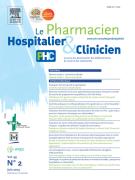Impact de l’antibiothérapie sur l’anticoagulation par médicaments anti-vitamines K - 13/03/14
Impact of antibiotherapy on the anticoagulant effect of vitamin K antagonist agents

 , J.-D. Kaiser a, M. Medjoub a, C. Cornette a, J. Leroy b, S. Limat a, c
, J.-D. Kaiser a, M. Medjoub a, C. Cornette a, J. Leroy b, S. Limat a, cCet article a été publié dans un numéro de la revue, cliquez ici pour y accéder
Résumé |
Introduction |
Les accidents hémorragiques liés aux anti-vitamines K (AVK) constituent la première cause iatrogène médicamenteuse en France. Les antibiotiques (ATB) sont susceptibles d’interagir avec les AVK. L’objectif de l’étude était de mesurer l’impact de l’antibiothérapie sur les INR des patients traités par AVK au CHRU de Besançon.
Matériel et méthode |
Nous avons réalisé une étude rétrospective, menée entre octobre 2011 et février 2012, basée sur l’exploitation des prescriptions informatisées. Les patients sous AVK à l’admission, puis bénéficiant ultérieurement d’une antibiothérapie 5 à 7jours après le début de l’hospitalisation, étaient inclus dans l’étude.
Résultats |
Quarante-trois patients ont été inclus et 456 mesures d’International Normalized Ratio (INR) ont été réalisées. L’intervalle thérapeutique cible pour la totalité des patients était compris entre 2 et 3. Les INR pendant l’antibiothérapie étaient significativement plus élevés que ceux avant l’antibiothérapie (p<0,0001). La fréquence de contrôle des INR était également significativement plus élevée pendant l’antibiothérapie (p=0,03).
Discussion–Conclusion |
Cette étude met en évidence le rôle important à jouer du pharmacien hospitalier, clinicien et officinal dans la recherche et la gestion des interactions médicamenteuses.
Le texte complet de cet article est disponible en PDF.Summary |
Introduction |
Vitamin K antagonists (AVK) are the first cause of iatrogenic mortality in France. Antibiotics are likely to interact with AVK. The aim of this study was to evaluate the impact of antibiotics on the INR of patients treated with oral anticoagulants at the University Hospital of Besançon.
Material and method |
We conducted a prospective study, between October 2011 and February 2012, based on the exploitation of the computerized prescription orders. Patients with oral anticoagulant at the admission and who received antibiotics 5 to 7 days after the admission were included in the study.
Results |
Forty-three patients were included and 456 measures of INR (International Normalized Ratio) were carried out. The therapeutic interval targets for the totality of the patients lay between 2 and 3. INR during the antibiotherapy were significantly higher than those before the antibiotherapy (P<0.0001). The frequency of control of the INR was significantly higher during the antibiotherapy (P=0.03).
Discussion–Conclusion |
This study underlines the significant role to play for hospital and clinical pharmacists in research and management of drug interactions.
Le texte complet de cet article est disponible en PDF.Mots clés : Anti-vitamines K, AVK, Antibiotiques, International Normalized Ratio (INR)
Keywords : Vitamin K antagonist, Antibiotics, International Normalized Ratio (INR)
Plan
Bienvenue sur EM-consulte, la référence des professionnels de santé.
L’accès au texte intégral de cet article nécessite un abonnement.
Déjà abonné à cette revue ?

